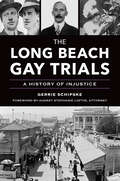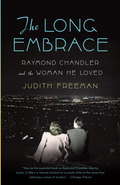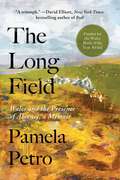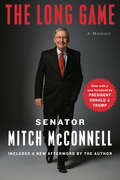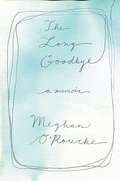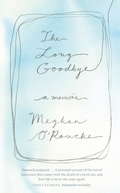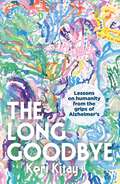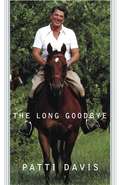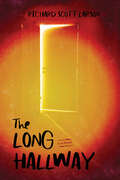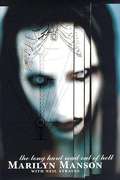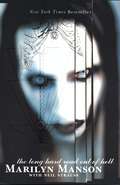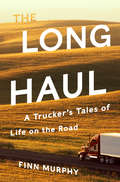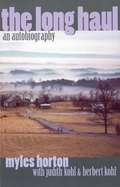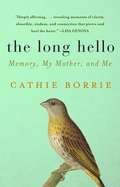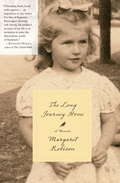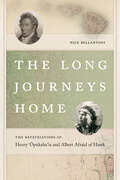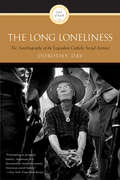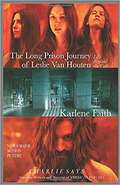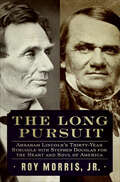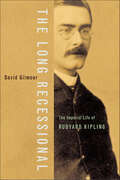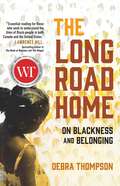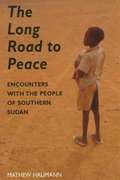- Table View
- List View
The Long Beach Gay Trials: A History of Injustice (True Crime)
by Gerrie SchipskeHow Long Beach caused the death of John A. Lamb. Immediately after his 1914 election as mayor of Long Beach, Louis Napoleon Whealton fired the chief of police and raided the city treasury. To replenish the funds, Mayor Whealton concocted a scheme to collect fines from any male “who made advances toward other men.” Two special police officers entrapped and arrested thirty-one men, dragging them before a judge to pay up or risk a public trial. When one victim refused to play along, newspapers were quick to publish the names of everyone accused, including local pharmacist and popular churchman John A. Lamb. His suicide made headlines, but the city continued to target gay men well into this century. Author and historian Gerrie Schipske uncovers the story of a tragic death with far-reaching consequences in Long Beach.
The Long Embrace: Raymond Chandler and the Woman He Loved
by Judith FreemanRaymond Chandler was among the most original and enduring crime novelists of the twentieth century. Yet much of his pre-writing life, including his unconventional marriage, has remained shrouded in mystery. In this compelling, wholly original book, Judith Freeman sets out to solve the puzzle of who Chandler was and how he became the writer who would create in Philip Marlowe an icon of American culture. Visiting Chandler's many homes and apartments, Freeman uncovers vestiges of the Los Angeles that was Chandler's terrain and inspiration for his imagination. She also uncovers the life of Cissy Pascal, the older, twice-divorced woman Chandler married in 1924. A revelation of a marriage that was a wellspring of need, illusion, and creativity, The Long Embrace provides us with a more complete picture of Raymond Chandler's life and art than any we have had before.
The Long Field: Wales and the Presence of Absence, a Memoir
by Pamela PetroFor readers of H Is for Hawk, an intimate memoir of belonging and loss and a mesmerizing travelogue through the landscapes and language of WalesHiraeth is a Welsh word that's famously hard to translate. Literally, it can mean "long field" but generally translates into English, inadequately, as "homesickness." At heart, hiraeth suggests something like a bone-deep longing for an irretrievable place, person, or time—an acute awareness of the presence of absence. In The Long Field, Pamela Petro braids essential hiraeth stories of Wales with tales from her own life—as an American who found an ancient home in Wales, as a gay woman, as the survivor of a terrible AMTRAK train crash, and as the daughter of a parent with dementia. Through the pull and tangle of these stories and her travels throughout Wales, hiraeth takes on radical new meanings. There is traditional hiraeth of place and home, but also queer hiraeth; and hiraeth triggered by technology, immigration, ecological crises, and our new divisive politics. On this journey, the notion begins to morph from a uniquely Welsh experience to a universal human condition, from deep longing to the creative responses to loss that Petro sees as the genius of Welsh culture. It becomes a tool to understand ourselves in our time. A finalist for the Wales Book of the Year Award and named to the Telegraph's and Financial Times's Top 10 lists for travel writing, The Long Field is an unforgettable exploration of &“the hidden contours of the human heart.&”
The Long Game: A Memoir
by Mitch McconnellIn October 1984, a hard-charging Kentucky politician waited excitedly for President Ronald Reagan to arrive at a presidential rally in Louisville. In the midst of a tough Senate campaign against an incumbent Democrat, the young Republican hoped Reagan's endorsement would give a much-needed boost to his insurgent campaign. He even had a camera crew ready to capture the president's words for a TV commercial he planned to air during the campaign's final stretch. Alas, when Reagan finally stepped to the microphone, he smiled for the crowd and declared: "I'm happy to be here with my good friend, Mitch O'Donnell." That was hardly Mitch McConnell's first setback, and far from his last. But as he learned when running his very first campaign for student body president in high school, you don't have to be the most popular, the most athletic, or even the luckiest kid to win. You just need to run the best campaign. So he swallowed hard, put his head down, and kept going. Four weeks later, in the biggest upset of the year, his dream of being a US senator came true--by a margin of about one vote per precinct. By persevering, he'd be the only Republican in the country to beat an incumbent Democratic US senator. McConnell learned patience and fortitude during his post-World War II youth in Alabama. His mother helped him beat polio by leading him through long, aching exercises every day for two years. His father taught him the importance of standing up to bullies, even if it meant taking the occasional punch. It turned out to be the perfect childhood for a future Senate majority leader. "In the line of work I would choose, compromise is key, but I'd come to find that certain times required me to invoke the fighting spirit both of my parents instilled in me." The Long Game is the candid, behind-the-scenes memoir of a man famous for his discretion. For more than three decades, McConnell has worked steadily to advance conservative values, including limited government, individual liberty, fiscal prudence, and a strong national defense. But he has always cared much more about moving the ball forward than about who gets the credit.Even in recent years, when some of his colleagues seem obsessed with maintaining and cultivating their images in a twenty-four-hour news cycle, McConnell focuses on how today's controversies will affect the country in a year, or two, or ten. Now McConnell reveals what he really thinks about the rivalry between the Senate and the House; the players and the stakes involved when a group of political opportunists tried to hijack the Tea Party movement; and key figures such as Barack Obama, Joe Biden, and Harry Reid. He tells the inside story of the battle against Obamacare and other fights to protect the US Constitution against further encroachment by an out-of-control White House that's stuck in a permanent campaign. He explains the real causes of the chronic gridlock that has so many voters enraged, his ongoing efforts to restore the US Senate's indispensable dual role as a brake on excess and a tool for national consensus, and what ordinary citizens have a right to expect from Washington. In today's atmosphere of impatience and instant gratification, McConnell still believes the Founders knew best when they instituted a government with checks and balances. As he writes, "In the end, the goal isn't a perfectly running congressional machine or a party without blemish or inner turmoil. The goal is to allow the country to work out its differences freely and energetically, confident that the institutions the Founders left us are capable of accommodating the disputes and disagreements that arise in a nation as big and diverse and open as ours."From the Hardcover edition.
The Long Goodbye
by Meghan O'RourkeWhat is it like to mourn today, in a culture that has largely set aside rituals that acknowledge grief? After her mother died of cancer at the age of fifty-five, Meghan O'Rourke found that nothing had prepared her for the intensity of her sorrow. She began to create a record of her interior life as a mourner, trying to capture the paradox of grief--its monumental agony and microscopic intimacies--an endeavor that ultimately bloomed into a profound look at how caring for her mother during her illness changed and strengthened their bond. With lyricism and unswerving candor, The Long Goodbye captures the fleeting moments of joy that make up a life and the way memory can lead us out of the jagged darkness of loss. Effortlessly blending research and reflection, the personal and the universal, it is a love letter from a daughter to a mother that will touch any reader who has felt the powerful ties of familial love.
The Long Goodbye
by Meghan O'RourkeFrom one of America's foremost young literary voices, a transcendent portrait of the unbearable anguish of grief and the enduring power of familial love. What does it mean to mourn today, in a culture that has largely set aside rituals that acknowledge grief? After her mother died of cancer at the age of fifty-five, Meghan O'Rourke found that nothing had prepared her for the intensity of her sorrow. In the first anguished days, she began to create a record of her interior life as a mourner, trying to capture the paradox of grief-its monumental agony and microscopic intimacies-an endeavor that ultimately bloomed into a profound look at how caring for her mother during her illness changed and strengthened their bond. O'Rourke's story is one of a life gone off the rails, of how watching her mother's illness-and separating from her husband-left her fundamentally altered. But it is also one of resilience, as she observes her family persevere even in the face of immeasurable loss. With lyricism and unswerving candor, The Long Goodbye conveys the fleeting moments of joy that make up a life, and the way memory can lead us out of the jagged darkness of loss. Effortlessly blending research and reflection, the personal and the universal, it is not only an exceptional memoir, but a necessary one.
The Long Goodbye: A Memoir
by Meghan O'RourkeMeghan O'Rourke was thirty-two when her mother died of cancer on Christmas Day, 2008. As a writer, even in the depths of her grief, she was fascinated by what she observed of herself in the aftermath: the rage she felt, not only at what had happened to her mother, but also at the inability of people to acknowledge her pain; her sense that the meaning of her life had changed fundamentally with the loss of a parent; the way that the reassuringly familiar often became somehow completely new and strange. The Long Goodbye interleaves personal recollections of her much-loved mother with an examination of what it means to grieve in a society which no longer has the rituals - or even, most of the time, the desire - to engage with grief, to understand it, and to let it do both its worst - and its best.
The Long Goodbye: Lessons on humanity from the grips of Alzheimer’s
by Keri KitayA powerful mix of memoir and hard-earned knowledge, in The Long Goodbye, Keri Kitay charts her family's poignant and devastating journey after their mother was diagnosed with early onset Alzheimer's disease. When Keri Kitay's mother, Terry, was diagnosed with early-onset Alzheimer's disease, nothing could have prepared her family for what lay ahead. The diagnosis and the years that followed rocked their world in unimaginable ways.In this powerful mix of memoir and hard-earned knowledge, Keri charts her family's journey: what life was like before Alzheimer's, the early signs that everybody missed, the day they got the shattering news, coming to terms with the grim prognosis . . . and most devastatingly, witnessing the woman they knew and loved slowly fade away.Poignant and moving, The Long Goodbye is a stirring account of losing a parent to the ravages of an unforgiving disease and a heartfelt exploration of what it means to face this with grace and dignity.This is a story about ordinary family ties which became extraordinary through necessity, about unbreakable bonds and unconditional love, and what holds us close even in the most heartbreaking of circumstances.'A significant resource for anyone faced with dementia' PROFESSOR HENRY BRODATY
The Long Goodbye: Memories Of My Father
by Patti DavisRonald Reagan's daughter writes with a moving openness about losing her father to Alzheimer's disease. The simplicity with which she reveals the intensity, the rush, the flow of her feelings encompasses all the surprises and complexities that ambush us when death gradually, unstoppably invades life.In The Long Goodbye, Patti Davis describes losing her father to Alzheimer's disease, saying goodbye in stages, helpless against the onslaught of a disease that steals what is most precious-a person's memory. "Alzheimer's," she writes, "snips away at the threads, a slow unraveling, a steady retreat; as a witness all you can do is watch, cry, and whisper a soft stream of goodbyes."She writes of needing to be reunited at forty-two with her mother ("she had wept as much as I over our long, embittered war"), of regaining what they had spent decades demolishing; a truce was necessary to bring together a splintered family, a few weeks before her father released his letter telling the country and the world of his illness . . .The author delves into her memories to touch her father again, to hear his voice, to keep alive the years she had with him.She writes as if past and present were coming together, of her memories as a child, holding her father's hand, and as a young woman whose hand is being given away in marriage by her father . . . of her father teaching her to ride a bicycle, of the moment when he let her go and she went off on her own . . . of his teaching her the difference between a hawk and a buzzard . . . of the family summer vacations at a rented beach house-each of them tan, her father looking like the athlete he was, with a swimmer's broad shoulders and lean torso. . . . She writes of how her father never resisted solitude, in fact was born for it, of that strange reserve that made people reach for him. . . . She recalls him sitting at his desk, writing, staring out the window . . . and she writes about the toll of the disease itself, the look in her father's eyes, and her efforts to reel him back to her. Moving . . . honest . . . an illuminating portrait of grief, of a man, a disease, and a woman and her father.From the Hardcover edition.
The Long Gray Line
by Rick AtkinsonBased on the true story of Marty Maher, a humble Irish immigrant who rose through the ranks to become one of West Point's most beloved instructors. A rousing tribute to a remarkable man & his way of life.
The Long Hallway (Living Out: Gay and Lesbian Autobiog)
by Richard Scott LarsonGrowing up queer, closeted, and afraid, Richard Scott Larson found expression for his interior life in horror films, especially John Carpenter’s 1978 classic, Halloween. He developed an intense childhood identification with Michael Myers, Carpenter’s inscrutable masked villain, as well as Michael’s potential victims. In The Long Hallway, Larson scrutinizes this identification, meditating on horror as a metaphor for the torments of the closet. Larson was only nine years old when he recognized something of his own experience in how Michael Myers hid his true face from the world. This spark of recognition ignited his imagination while he searched for clues to what the future might hold for boys like him, all the while being made to understand his nascent sexuality as deviant and punishable. Like in the movies, his superficially safe suburban childhood was in fact filled with threat: a classmate’s murder, his father’s alcoholism and death, and his own sexual assault by a much older man. The figurative mask Larson learned to wear could not contain his yearning to be seen and desired. In the aftermath of this violence, his boyhood self came to believe that fear and desire would be forever intertwined. This lyrical memoir expresses a boy’s search for identity while navigating the darkness and isolation of a deeply private inner world. With introspection and tenderness, Larson reflects on how little we understand in the moment about the experiences that mark us forever.
The Long Hard Road Out of Hell
by Marilyn MansonThis book is an autobiography of America's most controversial celebrity icon, Marilyn Manson.
The Long Hard Road Out of Hell
by Neil Strauss Marilyn MansonWhen this best-selling autobiography was originally released, readers were shocked: The Long Hard Road Out of Hell was the darkest, funniest, most controversial, and best-selling rock book of its time-and it became the template, both visually and narratively, for almost every rock book since. Marilyn Manson is not just a music icon, it turned out, but one of the best storytellers of his generation. Written with bestselling author Neil Strauss, beautifully designed with dozens of exclusive photographs, and modeled on Dante's Inferno, this edition of The Long Hard Road Out of Hell features a bonus chapter not in the hardcover. In the shocking and candid memoir, Manson takes readers from backstage to emergency rooms to jail cells, from the pit of despair to the top of the charts, and recounts his metamorphosis from a frightened Christian schoolboy into the most feared and revered music superstar in the country. Along the way, you'll hear what happens to fans-and celebrities-who dare to venture backstage with the one of the world's most dangerous rock stars. In the words of Elle magazine, the book "makes Madonna's infamous Sex seem downright wholesome in comparison."
The Long Haul: A Trucker's Tales Of Life On The Road
by Finn Murphy“There’s nothing semi about Finn Murphy’s trucking tales of The Long Haul.”—Sloane Crosley, Vanity Fair More than thirty years ago, Finn Murphy dropped out of college to become a long-haul trucker. Since then he’s covered more than a million miles as a mover, packing, loading, hauling people’s belongings all over America. In The Long Haul, Murphy recounts with wit, candor, and charm the America he has seen change over the decades and the poignant, funny, and often haunting stories of the people he encounters on the job.
The Long Haul: an Autobiography
by Herbert Kohl Judith Kohl Myles HortonIn his own direct, modest, plain-spoken style, Myles Horton tells the story of the Highlander Folk School. A major catalyst for social change in the United States for more than sixty years, this school has touched the lives of so many people, Martin Luther King, Jr., Rosa Parks, Eleanor Roosevelt, and Pete Seeger. Filled with disarmingly honest insight and gentle humor, The Long Haul is an inspiring hymn to the possibility of social change. It is the story of Myles Horton, in his own words: the wise and moving recollections of a man of uncommon determination and dignity. [From the Book Jacket]
The Long Hello: Memory, My Mother, and Me (The\long Hello Ser.)
by Cathie BorrieThe moving memoir of caring for a parent with Alzheimer’s that broke new ground, changed the narrative, and prompted Maya Angelou to exclaim, “Joy!” Since Cathie Borrie delivered her keynote performance at the World Alzheimer’s Day event, her self-published manuscript has won rapturous praise from noted writers and Alzheimer’s experts alike—from Maya Angelou, Lisa Genova, and Molly Peacock to Dr. Bill Thomas, Jed A. Levine of the Alzheimer’s Association, NYC, and Meryl Comer of the Geoffrey Beene Foundation Alzheimer’s Initiative. The Long Hello distills the seven years the author spent caring for her mother into a page-turning account that offers insight into the “altering world of the dementia mind.” During that time, Borrie recorded brief conversations she had with her mother that revealed the transformations within—and sometimes yielded an almost Zen-like poetry. She includes selections from them in chapters about her experience that are as evocative as diary entries. Her mother was the emotional pillar and sometime breadwinner in a home touched by a birth father’s alcoholism, a brother’s early death, divorce, and a stepfather’s remoteness. In Borrie’s spare prose, her mother’s story becomes a family’s story as well a deeply loving portrait that embraces life.
The Long Journey Home: A Memoir
by Margaret RobisonFirst introduced to the world in her sons’ now-classic memoirs—Augusten Burroughs’s Running with Scissors and John Elder Robison’s Look Me in the Eye—Margaret Robison now tells her own haunting and lyrical story. A poet and teacher by profession, Robison describes her Southern Gothic childhood, her marriage to a handsome, brilliant man who became a split-personality alcoholic and abusive husband, the challenges she faced raising two children while having psychotic breakdowns of her own, and her struggle to regain her sanity. Robison grew up in southern Georgia, where the façade of 1950s propriety masked all sorts of demons, including alcoholism, misogyny, repressed homosexuality, and suicide. She met her husband, John Robison, in college, and together they moved up north, where John embarked upon a successful academic career and Margaret brought up the children and worked on her art and poetry. Yet her husband’s alcoholism and her collapse into psychosis, and the eventual disintegration of their marriage, took a tremendous toll on their family: Her older son, John Elder, moved out of the house when he was a teenager, and her younger son, Chris (who later renamed himself Augusten), never completed high school. When Margaret met Dr. Rodolph Turcotte, the therapist who was treating her husband, she felt understood for the first time and quickly fell under his idiosyncratic and, eventually, harmful influence. Robison writes movingly and honestly about her mental illness, her shortcomings as a parent, her difficult marriage, her traumatic relationship with Dr. Turcotte, and her two now-famous children, Augusten Burroughs and John Elder Robison, who have each written bestselling memoirs about their family. She also writes inspiringly about her hard-earned journey to sanity and clarity. An astonishing and enduring story, The Long Journey Home is a remarkable and ultimately uplifting account of a complicated, afflicted twentieth-century family.From the Hardcover edition.
The Long Journeys Home: The Repatriations of Henry ‘Opukaha‘ia and Albert Afraid of Hawk (The Driftless Connecticut Series)
by Nick BellantoniHenry ‘Opukaha‘ia (ca. 1792–1818), Native Hawaiian, and Itankusun Wanbli (ca. 1879–1900), Oglala Lakota, lived almost a century apart. Yet the cultural circumstances that led them to leave their homelands and eventually die in Connecticut have striking similarities. <P>‘Opukaha‘ia was orphaned during the turmoil caused in part by Kamehameha’s wars in Hawai’i and found passage on a ship to New England, where he was introduced and converted to Christianity, becoming the inspiration behind the first Christian missions to Hawai’i. Itankusun Wanbli, Christianized as Albert Afraid of Hawk, performed in Buffalo Bill’s “Wild West” as a way to make a living after his traditional means of sustenance were impacted by American expansionism. <P><P>Both young men died while on their “journeys” to find fulfillment and both were buried in Connecticut cemeteries. In 1992 and 2008, descendant women had callings that their ancestors “wanted to come home” and began the repatriation process of their physical remains. <P><P>CT state archaeologist Nick Bellantoni oversaw the archaeological disinterment, forensic identifications and return of their skeletal remains back to their Native communities and families. The Long Journeys Home chronicles these important stories as examples of the wide-reaching impact of American imperialism and colonialism on Indigenous Hawaiian and Lakota traditions and their cultural resurgences, in which the repatriation of these young men have played significant roles. <P><P>Bellantoni’s excavations, his interaction with two Native families and his participation in their repatriations have given him unique insights into the importance of heritage and family among contemporary Native communities and their common ground with archaeologists. His natural storytelling abilities allow him to share these meaningful stories with a larger general audience.
The Long Loneliness
by Dorothy DayA compelling autobiographical testament to the spiritual pilgrimage of a woman who, in her own words, dedicated herself "to bring[ing] about the kind of society where it is easier to be good.''
The Long Loneliness: The Autobiography of Dorothy Day
by Dorothy DayThis is the story of Day's life and her conversion to Catholicism.
The Long Prison Journey of Leslie Van Houten: Life Beyond the Cult
by Karlene FaithA criminology professor goes behind bars to chronicle the extraordinary story of Leslie Van Houten, one of the infamous "Manson girls," describing her early life, her involvement with Charles Manson and his group's 1969 murder rampage, her life in prison, and her struggle to rediscover her own identity. This work, presents the first in-depth look at how this “girl-next-door” became one of Manson’s “girls.”
The Long Pursuit: Abraham Lincoln's Thirty-Year Struggle with Stephen Douglas for the Heart and Soul of America
by Roy Morris Jr.A study of the rivalry between two American politicians and how it transformed them & the nation they sought to lead in the dark days before the Civil War.“This intimate dual portrait of Abe Lincoln and Stephen Douglas as young men . . . is a delight to read and a revealing journey through a mid-nineteenth-century America careening toward disaster.” —Kenneth Ackerman, author Young J. Edgar and Boss TweedFor the better part of two decades, Stephen Douglas was the most famous and controversial politician in the United States, a veritable “steam engine in britches.” Abraham Lincoln was merely Douglas’s most persistent rival within their adopted home state of Illinois, known mainly for his droll sense of humor, bad jokes, and slightly nutty wife.But from the time they first set foot in the Prairie State in the early 1830s, Lincoln and Douglas were fated to be political competitors. The Long Pursuit tells the dramatic story of how these two radically different individuals rose to the top rung of American politics, and how their personal rivalry shaped and altered the future of the nation during its most convulsive era. Indeed, had it not been for Douglas, who served as Lincoln’s personal goad, pace horse, and measuring stick, there would have been no Lincoln-Douglas debates in 1858, no Lincoln presidency in 1860, and perhaps no Civil War six months later. For both men—and for the nation itself—the stakes were that high.Not merely a detailed political study, The Long Pursuit is also a compelling look at the personal side of politics on the rough-and-tumble western frontier. It shows us a more human Lincoln, a bare-knuckles politician who was not above trading on his wildly inaccurate image as a humble “rail-splitter,” when he was, in fact, one of the nation’s most successful railroad attorneys. And as the first extensive biographical study of Stephen Douglas in more than three decades, the book presents a long-overdue reassessment of one of the nineteenth century’s more compelling and ultimately tragic figures, the one-time “Little Giant” of American politics.“With deft writing and prudent judgments, Morris captures [Douglas’s and Lincoln’s] burning ambition, political skills, and deeply held beliefs amid the turbulence of a country’s unfolding tragedy.” —Jeffry D. Wert, author of The Sword of Lincoln
The Long Recessional: The Imperial Life of Rudyard Kipling
by David GilmourA major new biography of Rudyard KiplingRudyard Kipling (1865-1936) was a unique figure in British history, a great writer as well as an imperial icon whose life trajectory matched that of the British Empire from its zenith to its final decades. Kipling was in his early twenties when his first stories about Anglo-Indian life vaulted him into celebrity. He went on to be awarded the Nobel Prize, and to add more phrases to the language than any man since Shakespeare, but his conservative views and advocacy of imperialism damaged his critical reputation -- while at the same time making him all the more popular with a general readership. By the time he died, the man who incarnated an era for millions was almost forgotten, and new generations must come to terms in their own way with his enduring but mysterious powers.Previous works on Kipling have focused exclusively on his writing and on his domestic life. Here, the distinguished biographer David Gilmour not only explains how and why Kipling wrote, but also explores the themes of his complicated life, his ideas, his relationships, and his views on the Empire and the future. Gilmour is the first writer to explore Kipling's public role, his influence on the way Britons saw themselves and their Empire. His fascinating new book, based on extensive research (especially in the underexplored archives of the United States), is a groundbreaking study of a great and misunderstood writer.
The Long Road Home: On Blackness and Belonging
by Debra ThompsonFrom a leading scholar on the politics of race comes a work of family history, memoir, and insight gained from a unique journey across the continent, on what it is to be Black in North America.When Debra Thompson moved to the United States in 2010, she felt like she was returning to the land of her ancestors, those who had escaped to Canada via the Underground Railroad. But her decade-long journey across Canada and the US transformed her relationship to both countries, and to the very idea of home. In The Long Road Home, Thompson follows the roots of Black identities in North America and the routes taken by those who have crisscrossed the world&’s longest undefended border in search of freedom and belonging. She begins in Shrewsbury, Ontario, one of the termini of the Underground Railroad and the place where members of her own family found freedom. More than a century later, Thompson still feels the echoes and intergenerational trauma of North American slavery. She was often the Only One—the only Black person in so many white spaces—in a country that perpetuates the national mythology of multiculturalism. Then she revisits her four American homes, each of which reveals something peculiar about the relationship between American racism and democracy: Boston, Massachusetts, the birthplace of the American Revolution; Athens, Ohio, where the white working class and the white liberal meet; Chicago, Illinois, the great Black metropolis; and Eugene, Oregon, the western frontier. She then moves across the border and settles in Montreal, a unique city with a long history of transnational Black activism, but one that does not easily accept the unfamiliar and the foreign into the fold. The Long Road Home is a moving personal story and a vital examination of the nuances of racism in the United States and Canada. Above all, it is about the power of freedom and the dreams that link and inspire Black people across borders from the perspective of one who has deep ties to, critiques of, and hope for both countries.
The Long Road to Peace: Encounters with the People of Southern Sudan
by Mathew HaumannA missionary in the Sudan talks about his life.
